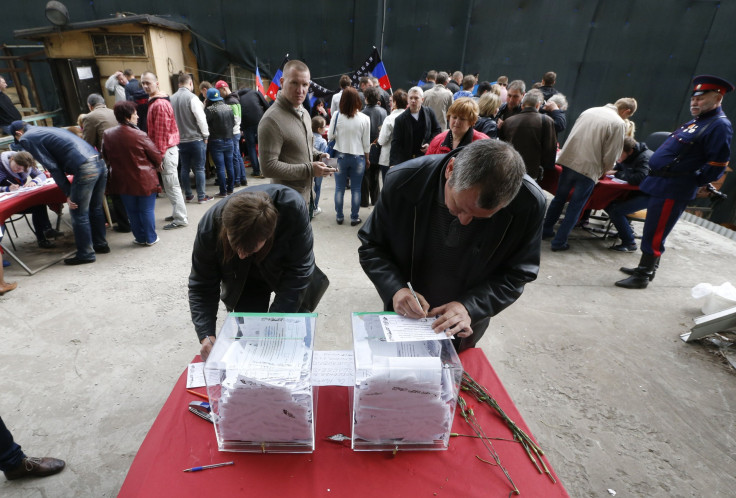Eastern Ukraine Referendum: Long Lines, Guns And A Makeshift Ballot

Eastern Ukrainians came out in droves to vote in a controversial referendum deemed illegal and illegitimate by the Ukrainian government.
Votes were held in two heavily pro-Russian oblasts [adminstrative regions]: Donetsk and Luhansk. The referendum ballots offer one question: “Do you support the act of state self-rule of Luhansk/Donetsk?”
Result is expected to be heavily in favor of independence.
With fears of eastern “fascists” and Western meddling, many eastern Ukrainians genuinely want their oblast to be its own country or a part of Russia, but not nearly as much as the referendum is likely to show. The West calls it a sham, a fake vote orchestrated by separatists or even by Russia itself.
Ukraine’s interim Prime Minister Arseniy Yatsenyuk said it lacked all legitimacy, going as far as saying the referendum “doesn’t exist.”
Meanwhile Sergei, an engineer living in Mariupol, Donetsk, told Reuters that the vote has great significance, including “leaving behind that fascist, pro-American government (in Kiev), which brought no one any good."
Residents spent their Sunday sitting in long queues at makeshift ballot stations set up at schools and post offices across eastern Ukraine (in Moscow too). Security was provided by armed separatists who have held control over the region since April.
Reporters say there is little safeguard against voter fraud. Some stations aren’t marking off names and require only a passport or proof of residency from residents to participate.
Journalist Matt McGarry says he saw people voting twice. One journalist reportedly voted at four different stations and even voted for his “wife” -- who doesn’t exist.
Close-up of video frame showing woman dropping two ballots into voting box. #referendum #Donetsk pic.twitter.com/jjAVpJn8N9
- Matt McGarry (@mattmcgarry) May 11, 2014While the referendum is all but a lock, a recent Pew Research Center survey suggested that Ukrainian sentiment may be far more complicated than what the referendum ballot suggests. Seven out of 10 eastern Ukrainians told Pew they wanted Ukraine to remain united. Even among Russian speakers in the east, 27 percent don’t want to leave Ukraine.
Irina Popova, a teacher in Donetsk, told USA TODAY that while she’s conflicted about the situation, she sees the ballot as a way to show their disapproval of Kiev.
"Even though I am Russian, I lived all my life in Ukraine and I would never have thought of splitting it up, but what's happening now is unbearable. The referendum is the only way to show that we are against this fascism. There is no dialogue in Ukraine. There is no way to unite it again."
Russian President Vladimir Putin disagrees with Popova. In a sudden shift, he urged the two oblasts to hold off on the referendum and respect the legitimacy of the upcoming countrywide presidential election on May 25. He said the election was a “step in the right direction” for Ukraine. The folks from the Donetsk People’s Republic kindly refused.
The question remains what Luhansk and Donetsk will actually do following the referendum. One representative of the self-proclaimed Donetsk People’s Republic said the soon-to-be autonomous region could vote again on whether to join Russia or even to stay a part of a united Ukraine, the latter being a highly unlikely scenario.
However it goes, there are two things for sure: the Ukrainian military will continue its “antiterrorism” campaign aimed at gaining back control of the east and the affirmative referendum will boost separatists’ claims of legitimacy. The referendum is a given, but how the region and Kiev handle it will determine the ultimate fate of the east.
© Copyright IBTimes 2025. All rights reserved.






















